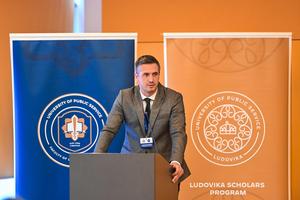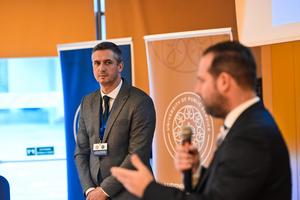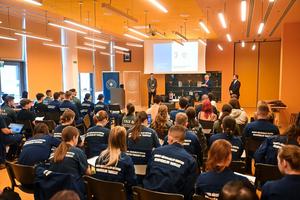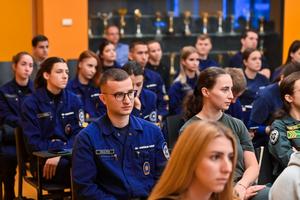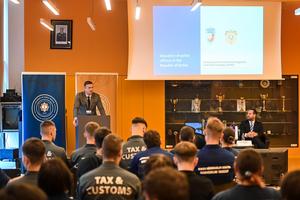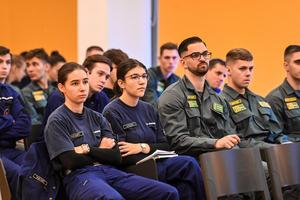As part of the Ludovika Scholars Program (LSP), the Department of Criminal Tactics and Criminal Methodology of the Faculty of Law Enforcement of the Ludovika University of Public Service (LUPS) hosted a lecture by Professor Nenad Radović, an expert in criminal sciences and Vice Rector for inter-institutional cooperation at the University of Criminal Investigation and Police Studies (UCIPS) in Belgrade. The event took place on October 15 at the LUPS Law Enforcement Training Building and Dormitory.
The internationally renowned and respected expert was welcomed by a full audience. In his lecture, he drew on his experience in criminal sciences and investigations, focusing on organized criminal groups observed in Serbia, human trafficking, and drug smuggling. Alongside crime statistics, he emphasized the importance of protecting human rights and fostering social cooperation, thereby contributing to the development of future law enforcement strategies.
The event was opened by Iván Gyurcsík, Rector’s Advisor for Regional Affairs, Head of the Minority Policy Research Workshop, and Program Director of the Ludovika Scholars Program. He noted that the event series is a relatively new initiative, launched in July 2022 in line with Rector Gergely Deli’s efforts to internationalize the region. Iván Gyurcsík emphasized that the LSP aims to promote international collaboration and knowledge sharing, bringing together experts from over twenty countries to collectively seek solutions to complex social challenges.
At the beginning of his lecture, Professor Radović stated that the founding of the UCIPS in Belgrade in 2018 marked a new chapter in police education. UCIPS is the only accredited higher education institution in Serbia that prepares future professionals according to the specific requirements of the policing profession.
In his address, the speaker elaborated on various aspects related to different crimes, homicides, and human rights. Topics included the analysis of homicide statistics and the role of specific groups and migrants in the evolution of crime. Professor Radović clarified the concept of an organized criminal group, defining it as a group of three or more individuals that exists for a specific period to commit one or more crimes for direct or indirect financial or other gains, with these crimes being punishable by at least four years of imprisonment.
Currently, twelve organized criminal groups are registered in Serbia, including the Zemun Clan and Trouble Velja. The speaker also addressed the issue of lawful enforcement, focusing on the political and violent activities of private groups. He went on to discuss the need to strengthen the powers of authorities and the importance of collaborative efforts. The professor also highlighted the role of small communities and the significance of cooperation.
Under the leadership of Police Colonel Bence Mészáros, the roundtable discussion following the lecture focused on legal enforcement, particularly inter-agency cooperation, with special emphasis on the role of the Kosovo Police. Insights were also shared on how the police conduct criminal investigations and work on large-scale operations.
Text:
Photos: Dénes Szilágyi
